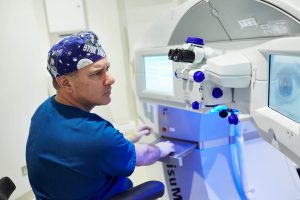How Technically Complex is LASIK Laser Eye Surgery?

The human eye is among the most complex systems in the known universe. With over two million working parts, the process that allows us to see the world around us in all its glory really is something to be in awe of. But does that mean that procedures designed to correct problems with the eye need to be equally complex? In other words, how technically complex is LASIK Laser Eye Surgery?
A Closer Look at the Eye
It only takes one part of the eye to be slightly abnormal for problems to emerge. For example, refractive errors such as myopia (short-sightedness), hyperopia (long-sightedness) and astigmatism all occur when the cornea or the eyeball itself is misshapen. This changes the way light is reflected into the eye, affecting how it reaches the retina.
For centuries, these errors have been corrected using relatively primitive external devices: glasses. Later on, a more discrete alternative entered the market in the shape of contact lenses. Of course, these aren’t without their problems, either.
Eventually, though, a new and innovative approach to vision correction emerged: Laser Eye Surgery. This new method allows surgeons to reshape the cornea to re-align the focal point of the eye. The idea is to change the focal point so it aligns perfectly with the retina, just as it should naturally.
The first iteration of the procedure was a surface ablation technique called PRK – which is still used today – which made it possible to directly alter the shape of the eye itself with laser technology. Soon after, a new development helped to take Laser Eye Surgery into the mainstream: LASIK, or laser-assisted in-situ keratomileusis. To this day, LASIK remains the most popular method of laser vision correction.
A Closer Look at LASIK
LASIK differs from the surface ablation approach to Laser Eye Surgery in the way the corneal bed is exposed for treatment. In PRK and LASEK, an area of corneal epithelium is removed entirely in order to reach the treatment area. In contrast, LASIK utilises a corneal flap which is created using a highly precise femtosecond laser.
Following the creation of the flap, a second laser – an excimer laser – is then used to remove a predetermined, microscopic amount of corneal tissue. Once this stage is complete, the corneal flap is simply put back in place where it begins to heal almost immediately. In the majority of cases, the flap will have healed in only a few hours—in comparison to PRK/LASEK where the epithelium repopulates over several days.
A Closer Look at the Excimer Laser
The excimer laser is arguably the most crucial element of Laser Eye Surgery. Its development did nothing short of revolutionising the whole field, increasing the safety, predictability, and overall performance of refractive surgeries.
Unlike the lasers we see in sci-fi films, the excimer laser is a “cold” laser. It works by utilising ultraviolet light rays to break down the molecular bonds in the corneal tissue. This allows the precise (and painless) removal of the pre-determined area of tissue, effectively reshaping the cornea.
The Zeiss MEL 90 excimer laser has proven to be the most accurate excimer laser in the world. Developed by a team of Laser Eye Surgery experts including our very own founder and expert surgeon, Professor Dan Reinstein, the MEL90 offers incredibly accurate and auto-stabilised delivery, along with the fastest responses of any laser, and cutting-edge eye-tracking technology.
All of this technology can seem a little overwhelming to the average person. It might even make LASIK sound like an extremely complex procedure. But the truth is, for a surgeon who has specialised for years in refractive surgery, the whole process is actually pretty straightforward. The position of the eye makes it relatively easy to examine and explore compared to other organs of the body, and so when it comes to fixing it, rest assured we certainly know our stuff.
If you’d like to learn more about our Laser Eye Surgery treatments and technology, get in touch with one of our friendly clinic coordinators or Book a Consultation today!


